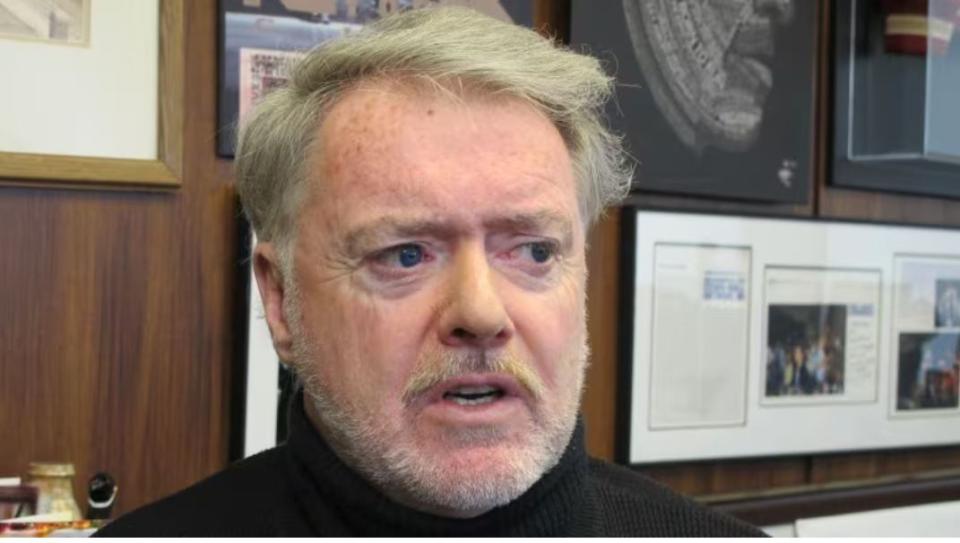


As the threat of 25 per cent tariffs on all Canadian imports persist, U.S. president-elect Donald Trump insists Canada should be cracking down on fentanyl making its way across the border, into his country.
“I said you have to close up your borders … and drugs are pouring in,” Trump said recently.
An Ontario border city mayor agrees with Trump — saying the drug is “destroying our communities” on both sides of the border.
Sarnia is across the St. Clair River from Port Huron, Mich.
Mayor Mike Bradley says any effort that can limit fentanyl’s movement — whether it’s going into the U.S. or Canada — is “most welcome.”
“It’s the black plague,” he told CBC Morning Live.

Vehicles entering the U.S. from Sarnia, Ont., on the Blue Water Bridge in a view from a U.S. Customs and Border Protection helicopter. (Rebecca Cook/Reuters)
“I would also like to see restoration of the RCMP detachment in Sarnia that was closed in 2019. We need that for boots on the ground. That’s really important.”
Bradley hopes Ottawa makes good on its promise of border-related changes, and does so as soon as possible.
However, he’s not sure how any of it will be viewed by Trump, and whether it will affect possible tariffs.
“It’ll never be enough. We’re being played.”


Sarnia Mayor Mike Bradley isn’t sure if border-related proposed spending by Ottawa will end up being enough in Donald Trump’s eyes to do do away with imposed tariffs he’s been threatening. (CBC News)
“Based on the other four years of the Trump administration, the attention changes very quickly from issue to issue to issue, so hopefully Canada will be out of the line of fire and they’ll move on to other issues,” said Bradley. He refers to the unpredictability of Trump as “tiresome” to deal with on a continual basis.
Disrupting the flow of the street drug is among promises made by the federal government. Others include 24/7 surveillance of the border with helicopters, drones and mobile surveillance towers. A new joint “strike force” targeting organized crime was also mentioned in the $1.3 billion Liberal spending plan.
Ottawa says it will use artificial intelligence and imaging tools to detect drugs such as fentanyl and its precursor chemicals.
WATCH | Trump’s concern about fentanyl at the border may really be about money:
Criminology professor Peter Reuter told CBC News he’s perplexed about why the president-elect thinks Canada would a prime source for the deadly street drug making its way into the U.S.
“It is extraordinary to think that anybody could read any of the data that are available and think that Canada is a threat to the U.S. with respect to fentanyl,” said Reuter, who teaches at the University of Maryland.
According to U.S. Customs and Border Protections, less than 20 kilograms of fentanyl was seized along the border with Canada last year, compared to more than 9,000 kilograms along the border with Mexico.
The Canada Border Services Agency (CBSA) says it seized 4.9 kilograms of fentanyl on its side of the U.S.-Canada border during 2023.
Jonathan Caulkins says the main source of fentanyl is outside of Canada and the U.S.
“It’s through a collaboration of people between China and Mexico, so that puts Canada and the United States together, sort of on the same side,” Caulkins, a Carnegie Mellon University professor, previously told CBC News.


Fentanyl, carfentanil and MDMA are pictured during an RCMP press conference in 2023. (Ben Nelms/CBC)
Other experts say Trump is actually looking for Ottawa to tighten its racketeering laws, according to David Asher, who led a previous Trump-era task force on fentanyl.
“Prime Minister Trudeau has the power to fix these things. I think if he goes ahead and announces that he’s going to … introduce new laws … and address these gaps, it’ll help with President Trump, I’m certain,” Asher told CBC News.
WATCH | Canada is not a significant source of fentanyl going into the U.S.: CBSA:
CBSA’s vice-president of intelligence and enforcement says incoming federal support around the border and fentanyl smuggling is appreciated.
Aaron McCrorie recently told CBC’s Rosemary Barton Live his agency has similar concerns about the drug as its U.S. counterpart, but he doesn’t think Canada plays a big role in what ends up across the border.
“Our assessment right now is that we’re not in any way a significant source of fentanyl going into the United States,” he said.
“That said, we still need to co-operate and combat fentanyl smuggling, the smuggling of precursors that manufacture fentanyl.”
“What it’s reflecting is the effect fentanyl is having on communities. We have a shared obligation.”